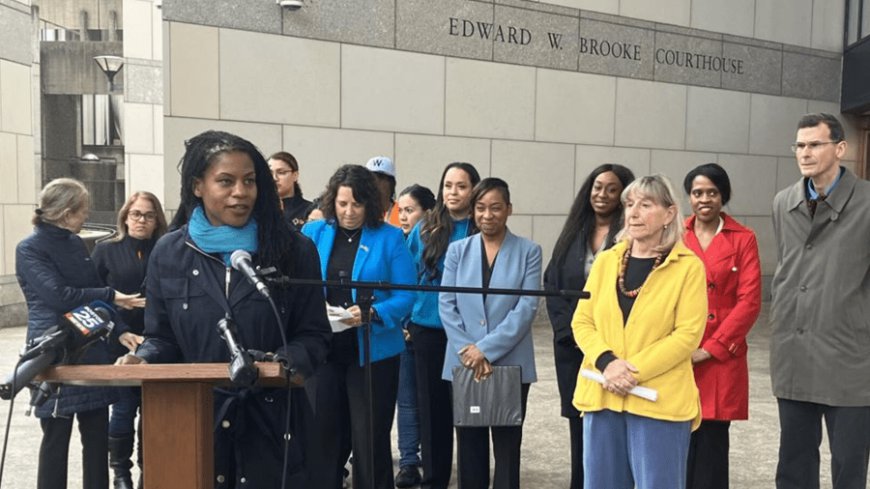Outreach efforts starting as eviction-sealing law takes effect

BOSTON (SHNS) - Thousands of Massachusetts residents gained a new tool in the search for stable housing Monday, as a law took effect allowing eligible tenants to have their past eviction records sealed.
Sen. Lydia Edwards, a longtime advocate for the law, said she already helped a constituent file an eviction-sealing petition Monday morning with the support of community organization City Life/Vida Urbana. Edwards said they used a website to fill out the paperwork.
"I was nervous. We got to, it was CourtFormsOnline.org -- went to there, looked up housing, had the petition, just clicked on that. And then it literally walks you through: What's your name, where's your docket, your docket number -- which everyone will need to have their docket number -- and then what's your address," Edwards said at a press conference outside the Edward W. Brooke Courthouse in downtown Boston, where the Eastern Housing Court is located.
"And then we just went through it together, and then filed it," the East Boston Democrat, who co-chaired the Joint Committee on Housing last session, continued. "It was filed directly in the court that it needed to go to, and we did this all from the public library."
Edwards, Lt. Gov. Kim Driscoll, Attorney General Andrea Campbell, Senate President Karen Spilka, Boston Chief of Housing Sheila Dillon and other officials joined advocates and housing attorneys outside the courthouse to raise awareness of the new law, which was embedded in the Affordable Homes Act that Gov. Maura Healey signed in August.
The new law is intended to remove a major barrier to housing stability. Eviction records are publicly-accessible court records, which landlords can currently use to deny housing to prospective tenants. Records are public even if tenants won a case or reached an agreement with a landlord, advocates said.
Eviction sealing is not an automatic process under the new law. Tenants who win their case, have a case dismissed or had a no-fault eviction case can petition to have their records sealed immediately after the appeal period ends, according to a fact sheet. Tenants will need to wait four years to petition after the end of a non-payment case, and seven years after a fault-eviction case.
The law also blocks credit and consumer reporting agencies from including information about sealed eviction records in their reports.
Nearly 5,000 evictions are filed annually in Boston, with "many" submitted at the courthouse where officials and advocates had gathered, Dillon said.
"About 1,500 of those eviction filings turn into actual evictions, and it is really hard for those families to oftentimes move on because of the records that they have acquired along the way," Dillon said.
She added, "It's wonderful to have this new tool, but it's also our work to make sure that less evictions happen every year by creating more affordable housing, providing more legal assistance, more rental relief. And so the work upstream needs to continue."
Greg Vasil, CEO of the Greater Boston Real Estate Board, said his organization initially opposed the eviction sealing law over safety concerns for tenants. Vasil said it's important for building owners to know about certain past offenses when screening prospective tenants.
GBREB eventually backed the law after years of dialogue with Edwards, including during her tenure as a city councilor, and with House Majority Leader Mike Moran of Brighton.
There will be "growing pains" with the new law, Vasil told the News Service.
"It's going to be a learning process for a lot of people. A lot of our owners are large owners that may have dealt with this in other jurisdictions across the country," Vasil said. "It's going to be a real sea change for the small owner, which a lot of us folks we don't represent. It's going to be very different for the mom and pops. They don't have a team, they don't necessarily have a legal staff that they can look at."
The Massachusetts Trial Court launched an online tool Monday, called the Eviction Sealing Guided Interview, to help Bay Staters navigate the process and file petitions electronically. Annette Duke, senior housing staff attorney at the Massachusetts Law Reform Institute, also encouraged residents to visit SealMyEviction.org for resources about the process.
Campbell called Monday a "historic and amazing day" for tenants. Black renters are 2.4 times more likely to have an eviction filed against them than their white counterparts, and Black women are at greatest risk of having an eviction record or case filed against them, the attorney general said.
"We want everyone today to know that if you have an eviction in the past, that starting today, this option may be available to us. So, it will be incumbent upon all of us to get this information out to the people across the commonwealth," Campbell said. "I want to promise, and I'm making a promise, that our office will do everything in its power to continue our trainings, Know Your Rights, providing legal clinics, materials, all the resources that we are able to provide to ensure that folks have access to this critical information."
WWLP-22News, an NBC affiliate, began broadcasting in March 1953 to provide local news, network, syndicated, and local programming to western Massachusetts. Watch the 22News Digital Edition weekdays at 4 p.m. on WWLP.com.
What's Your Reaction?
 Like
0
Like
0
 Dislike
0
Dislike
0
 Love
0
Love
0
 Funny
0
Funny
0
 Angry
0
Angry
0
 Sad
0
Sad
0
 Wow
0
Wow
0






































